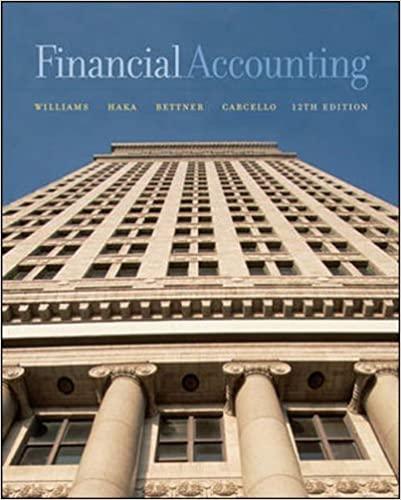Question
Question 10.2 Shooting Star, Inc. is considering a project that would have an eight -year life and would require a $2,000,000 investment in equipment. At
Question 10.2 Shooting Star, Inc. is considering a project that would have an eight -year life and would require a $2,000,000 investment in equipment. At the end of ten years, the project would terminate and the equipment would have no salvage value. The project would provide net income each year as follows:
Sales $2,000,000 Less: Variable Expenses $1,600,000 Contribution Margin $400,000 Less: Fixed Expenses $200,000 Net Income $200,000
All of the above items, except for depreciation of $200,000 a year, represent cash flows. The depreciation is included in the fixed expenses. The company's required rate of return is 10%. (Ignore income taxes in this problem.)
Required: 1. What is the project's net present value? 2. What is the project's internal rate of return? 3. What is the project's payback period? 4. What is the project's simple rate of return?
Question 10.3 Information on four potential projects is given below:
Projects A B C D Investment required $(350,000) $(390,000) $(450,000) $(480,000) Present value of cash inflows 535,000 590,000 670,000 730,000 Net present value $185,000 200,000 $220,000 $250,000 Ignore income taxes
Required: 1. Compute the project profitability index for each project. 2. Rank the projects in terms of preference.
Question 10.4 Elf on a Shelf Company bought a new computer-assisted design (CAD) software for $10,000,000 at the beginning of Year 1. The software has a useful life of 3 years and will save the company annual cash operating expenses of $4,000,000 in each of those 3 years. The software will have a zero net salvage value at the end of 3 years. It belongs to Class 12 with a capital cost allowance (CCA) rate of 100%. With special permission from the Canada Revenue Agency, the half-year CCA rule has been waived for the company to permit a maximum 100% CCA deduction for Year 1. The company's income tax rate and after-tax cost of capital are 40% and 12%, respectively.
Required: 1. Calculate the maximum total CCA tax shied available to the company. 2. Calculate the present value of the annual cash savings in operating expenses. 3. Calculate the net present value (NPV) of the investment. 4. Was the internal rate of return (IROR) greater than or less than the company's after-tax cost of capital of 12%? (Note: Do NOT try to calculate the implied actual internal rate or return.) 5. By how much must the annual savings in operating expenses be increased or decreased to make the investment just worthwhile, that is, either zero NPV or 12% IROR?
ABSOLUTELY NO AI/ chatGPT should be used.
Step by Step Solution
There are 3 Steps involved in it
Step: 1

Get Instant Access to Expert-Tailored Solutions
See step-by-step solutions with expert insights and AI powered tools for academic success
Step: 2

Step: 3

Ace Your Homework with AI
Get the answers you need in no time with our AI-driven, step-by-step assistance
Get Started


